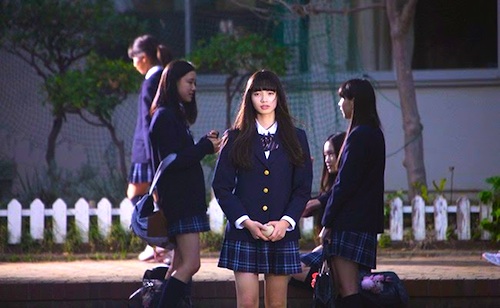By Joe Bendel. Showa Fujishima has made just about every parenting mistake a father can make and invented some that are uniquely his own. Not surprisingly, he really hasn’t been around much to see the results. At least that allows him to cling to a few willful misconceptions regarding Kanako. However, when his estranged ex-wife begrudgingly requests the ex-cop’s help finding their missing daughter, he learns far more than he bargained for in Tetsuya Nakashima’s The World of Kanako, which screens during the 2015 edition of Film Comment Selects.
Prepare to have your head messed with. Nakashima will fracture his timeline nearly beyond recognition and do his best to represent Fujishima’s warped perspective. The former copper now working as a rent-a-cop always had anger management issues, which directly led to his personal and professional disgrace. He is supposed to take drugs for his temper and mood swings, but they do not seem to be working, even though they might somewhat skew his perception of reality.
Kanako has already been missing for five days before Fujishima’s ex finally asks for his help. Intuitively, he assumes her disappearance is linked to the punky gang kids she has been hanging with, which is largely correct, but his presupposition that Kanako is an innocent victim will be rudely disabused. He soon learns she is up to her neck in drugs and pimping out classmates to well-heeled pedophiles. She was also apparently somehow mixed up in the suicide of her classmate Ogata. We will learn just exactly how so in flashbacks seen through the eyes of Boku, a secondary POV character, whose experiences with Kanako will parallel those of poor Ogata.
Meanwhile, Fujishima’s hostile former colleagues are more than happy to treat him as a suspect in a gangland-style killing perpetrated at the minimart he was ostensibly guarding. It turns out Kanako’s world is a small world when links turn up suggesting a connection between the convenience store massacre and her disappearance. Fujishima is in for a lot of pain and humiliation, but he will deal out plenty more to anyone he considers a potential suspect or accomplice.
Man, Kanako is dark, even by the standard Nakashima set in his previous films, Confessions and Memories of Matsuko. However, unlike the seamlessly constructed escalation of Confessions, WoK is a bit of a rat’s nest, compulsively flashing forward and backwards and liberally tossing unreliable perceptions or downright hallucinations to the point where many viewers will just drop the narrative thread and stop caring altogether, despite the occasional tongue-in-cheek hat-tips to 1970s exploitation cinema. The form of the film is enough to give you a headache, separate and apart from the rampant cruelty it depicts. Based on Akio Fukamachi’s novel, WoK is a nihilistic indictment of just about everything—that’s nihilism spelled with a capital “F” and a capital “U.”
To his credit, Kôji Yakusho doubles down over and over again as the violently erratic Fujishima. It is a messy, let-it-all-hang-out performance, but Yakusho takes it to such dark places, it is ultimately rather soul-scarring. Nana Komatsu is ethereally evil as the deceptively innocent looking Kanako, while Satoshi Tsumabuki chews the scenery with swaggering glee as Det. Asai, the sucker-sucking cop who apparently thinks he’s Kojack. Ai Hashimoto manages to add a thimble full of humanity to the film as Kanako’s estranged and disgusted middle school friend Morishita, but such figures of decency are few and far between in Kanako’s world. Frankly, it is hard to fully judge Kanako’s former homeroom teacher, Rie Higashi, but (Matsuko star) Miki Nakatani’s performance is truly riveting and maybe even redemptive.

If this is what life is really like for Japanese middle and high school students, I would immigrate if I were a parent. It is hard to imagine a more exhausting film than WoK, for reasons of both style and content. It is clearly the work of a genuine auteur, who does not get his just international due, but Nakashima really demands a great deal of indulgence this time around. Lacking the tightness of Confessions and the pure gut-wrenching emotional payoff of Matsuko, it just starts to feel like it is piling it on after a while. For those who enjoyed cult hits like Confessions, Lady Snowblood, Audition, and the real Oldboy, but found them too artificially optimistic, WoK will give you the straight shot of bile you crave. Recommended accordingly for ardent Nakashima admirers, The World of Kanako screens this Thursday (3/5), at the Walter Reade Theater, concluding this year’s Film Comment Selects.
LFM GRADE: C+
Posted on March 4th, 2015 at 10:11pm.